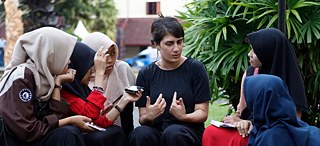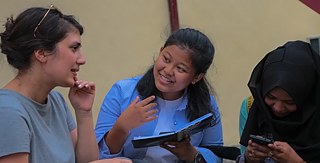Fatma Aydemir
Literature and Representation

Every year, authors from all over the world meet the people of South Sulawesi at the Makassar International Writers Festival. This time, everything revolves around voices and noise.
Von Fatma Aydemir
The first thing I notice after arriving in Indonesia is the smell of clove cigarettes. Then, the inquisitive young women. Their astute questions, their passion for dialogue. Time after time, I find myself in the middle of a conversation that starts as a warm welcome but soon develop into a discussion about existential questions: how does writing help us with our thought process? What is the healthy foundation of a regional identity? How can state and religion become compatible?
The Makassar International Writers Festival, which I am attending as a guest author from Berlin, opens the door for such conversations. Since 2011, Indonesian and international authors come together with locals in the port city of South Sulawesi every year. The discussions on and off the podium take place on the lush, green grounds of the former Dutch Fort Rotterdam. The atmosphere is casual, the topics range from human rights to feminism and storytelling. “Voice/Noise” is this year’s theme of the festival. It focuses on speaking and listening in times of chaotic noise; on the coexistence of different voices and issues.
Fear of Hardliners
The theme is highly topical, as the opening speech of festival director Lily Yulianti Farid reveals. She refers to two political events that encompass the festival program like a bracket. One is the 20-year-anniversary of dictator H. M. Soeharto who for 32 years reigned in Indonesia with an iron hand and was forced to resign from the presidency after a national uprising. Moreover, the presidential elections are due next year, and they fall into a tense period of time. The fear that Islamic hardliners will gain influence is huge. Political Islam experiences a revival, also in Indonesia. The fundamentalists preach a theocracy, where only Muslims can take over political posts. Particularly women and minorities would suffer if the previously tolerant practice of Islam in Indonesia would tilt into the radical.Authors like Feby Indirani or Hikmat Darmawan deliberatly try to counter this development. Indirani and Darmawan, with whom I will share the podium, recently started a new movement with the slogan: “Relax, it’s just religion.” “Religion is part of our identity, and it will stay that way. But we have to learn to be more relaxed about it, and not to understand it as compulsion,” Indirani explains. Humor is an important part of daily life, she adds. “It’s not about making fun of religion. But we must have the freedom to make jokes without having these jokes ending in a bloodbath.”
The author who came to the festival from Jakarta, also launches her book “Not Virgin Mary”, a collection of short stories from last year, which has now been translated into English. The stories revolve around the expectation of 72 virgins in paradise, a pig that wants to convert to Islam and covering up with a hijab. When Indirani reads out a surrealist story, in which a woman wearing a niqab wakes up in the morning without her nose, she gradually wraps herself with black veils until, at the end, only her eyes are visible through a slit. This performative element gives the medium short story a unique vehemence. Just like her fictional character, Indirani’s face slowly disappears. Without making a judgment, the author raises important questions.
Mainstream from Java
That there is much need for discussion about Islam becomes evident during my reading, which is held before Friday prayers at the University of Makassar. Thus, a lecturer who translates my parts of the discussion from English into Indonesian is suddenly close to tears after a passage from my novel. It talks about the desire of a little girl to wear hot pants. The lecturer reveals that she feels increasingly marginalized by the Muslim community in Makassar because of the way she dresses. The audience, which consists mostly of her own students, looks dejected and empathetic.
Representation must be a controversial topic in Indonesia: 17,000 islands, six (official) religions, 350 years of colonial history – what exactly is mainstream here? “Everything that revolves around Java”, says Jamil Massa. The author grew up in Makassar and during a panel discussion about “History and Tradition in Literature” says that as an adolescent he never found his own environment in Indonesian literature. All stories take place on the island of Java, all authors actually come from there.
Australian children’s book author Leoni Norrington laments a similar situation. She lives in the north of the country, the so-called “bush”, where white inhabitants like herself are numerically outnumbered by the indigenous people. “Nevertheless, Aboriginal children find little possibilities for identification, be it on TV or in literature. And if there are black characters, they are not the heroes of the story.” To change that, Norrington after the age of 50 began to write children’s books that are not set in big cities and not only revolve around white children.
Majorities and minorities, unequal power relations and visibility – these discourses seem to become more urgent all over the world today. Whether or not they can help us to become more tolerant – only time will tell. But, as the festival in Makassar shows, literature has the ability to phrase the urgent questions of society as clearly and sharp as possible. And without questions, we cannot begin with our search for solutions.